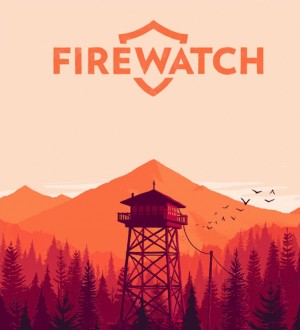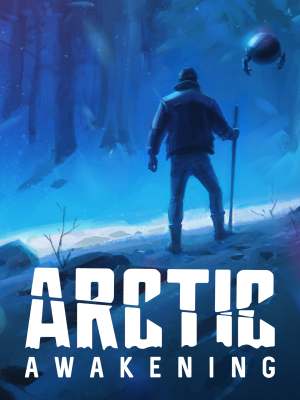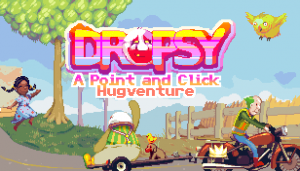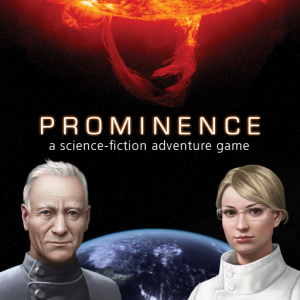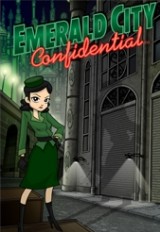Review for Firewatch
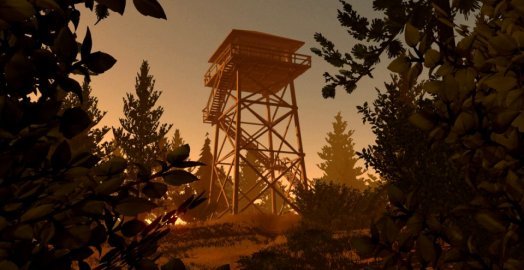
So often in games we play as someone special with an extraordinary task. The chosen one, the detective with psychic powers, the genetically engineered superhuman. Even our more mundane heroes rise to the occasion, pulled from their nondescript lives and thrust into conflict to achieve their hidden potential. Players love a good hero’s journey where they’re the hero, but much of the time the stories skip right past the early stages of the journey and get right to the good stuff, the part where our hero is skilled, confident, and ready to save the world. It’s a rare thing, then, to find a game where no one really needs saving, and the protagonists are just flawed, normal people trying to cope and connect under difficult circumstances.
Enter Firewatch, the debut title from Campo Santo, a new indie studio founded by industry veterans from Telltale, Double Fine, and Klei. The game is about a schlubby, depressed, bearded guy in his late thirties and the friendship he forms with an alcoholic forty-something woman he only talks to over the radio. You play as Henry, who takes a job with the National Park Service as a fire lookout in Wyoming. His wife Julia has been sick for years and has been put in a home near her parents, and despite his occasional visits Henry feels increasingly disconnected from her. To get away from things and clear his mind, he takes the fire lookout gig for the summer. The job entails hiking out to a remote tower in the middle of a vast national park and… well, watching for fires. His only point of human contact is his supervisor, another lookout in a nearby tower named Delilah.
The core mechanic of that relationship is also Firewatch’s most distinctive innovation. Early in the game you receive a walkie-talkie tuned to Delilah’s frequency, and from that point on she is a near-constant presence. In general the game plays like a traditional 3D first-person adventure, though you explore the environment with greater mobility than usual, mantling over ledges and climbing down steep inclines using a gamepad or WASD and mouse. When you find an object of interest you can pick it up, examine it (I’m a sucker for games that let you rotate objects around and examine them from all sides), and hold onto it or chuck it comically to the ground.
Where Firewatch really separates itself from the norm is that for almost every action, a small icon will pop up on screen letting you know that you can ‘report in’ to Delilah: press a button to bring up your walkie-talkie and you’ll see a set of dialogue prompts relating to the thing you’re reporting on. Say you’ve reached a treacherous-looking canyon. You could berate Delilah for sending you on a dangerous path instead of a safer way around, or you could give the canyon a snarky named like ‘Cripple Gulch’ and get her bemused reaction. You might report that you found a crushed beer can or a small turtle, sparking a short conversation. Or you might find a locked chain-link fence in the middle of nowhere and radio in to ask what lies beyond.
The radio is the perfect symbol of the game’s central theme. Henry is always and never alone. Delilah is only ever a call away, and the conversations they share are Firewatch’s greatest success. The walkie-talkie doesn’t pause gameplay, so you can keep exploring and playing as the dialogue plays out. No matter what’s being discussed, you’re almost always learning more about one or both of them. The sheer number of dialogue triggers are impressive, and they’re almost all funny or interesting or both. There’s a potential reaction to almost everything you do, and the dialogue changes based on your previous actions. Did you name that spot Cripple Gulch? Well, now it’ll be Cripple Gulch in your conversations for the duration of the game.
Dialogue choices aren’t the only decisions you’ll make, however. Early on you encounter some campers recklessly shooting off fireworks. You are given a number of options in how to deal with the situation. You can rudely chase them off or politely ask them to leave. You can clean up their campsite or leave it be. You can even choose to steal their boombox or chuck it into the water. For each of these actions, the dialogue changes, with Delilah either praising your professionalism, subtly egging your mischief on, or chiding you for not doing your job. If you choose to wander away in the opposite direction, you’re free to do so, but Delilah is going to chime in and ask you what the heck you’re doing. There’s a hugely impressive density and breadth of dialogue considering the small scope of the game.
That’s a good thing, as otherwise you spend the vast majority of your time simply walking around the sizable wilderness. The Shoshone National Park is pretty big, and being in Wyoming consists mostly of rocks and trees. The game is separated into days, and each day you’re likely to have to walk from one end of the park to the other, crisscrossing and backtracking through familiar ground. The map is semi-open – most locations are accessible at any time and many have a couple of different potential paths between them. The openness is appreciated but a little undercooked. Other than a few lines of extra dialogue, there’s really no incentive to do anything other than follow your immediate objective. Smartly, the game only shows objective locations on the in-game map, which is a folding paper map that Henry pulls up in front of his face. You’ll need to actually pay attention to the landscape to navigate, at least at first. By the halfway point of the game I had learned the area well enough to travel without it.
There aren’t really any puzzles to speak of. You do have objectives, and there are obstacles blocking your progress like locked gates or overgrown branches, but the game never tucks the solutions very far out of sight. Need wooden boards to repair a broken window? Check your immediate vicinity and you’ll find a bunch. Can’t explore down a cliff because you don’t have rock climbing pitons? Don’t worry, the next area over will have them. Like the modern narrative-driven Telltale formula that Firewatch’s lead developers helped hone, the challenges in the game are kept to a minimum, encouraging constant forward progress and carefully considered pacing rather than the start-stop-start-stop of puzzle-laden adventures.
But yes, there’s a lot of walking. And while Henry is a good deal more agile than many adventure game protagonists, in practice his jumps and climbs are little more than button prompts along otherwise long stretches of walking. There’s never any danger; you can’t fail and get hurt while climbing, for example, and the exploratory potential is diminished because climbable objects and ledges have distinctive shapes and discoloration, and they are rarely set beyond the beaten path. Excellent animations sell Henry as a normal dude who’s a little out of his element in the deep woods, but the fourth time you press a button to slowly clamber up the same copy-and-paste set of rocks along the same path you’ve traversed over and over while backtracking to the lookout tower, it gets a little old.
Therein lays my slight disappointment with Firewatch. As strictly linear narrative experiences go, it’s a very good one, but the game introduces mechanics that suggest an openness to the world that doesn’t really exist. You can climb, but only in a few places where needed. You can cut down brush with a fire axe, but only in a couple of spots that the plot requires. You can use your flashlight at any time, but there’s only one location where it’s at all useful. The same thing goes for the narrative choices in the game. Despite the multitude of ways you can play out the encounter with the fireworks-launching campers early on, other than a few tweaks to the dialogue, nothing in the game changes. You might choose a hostile response to Delilah after a stressful moment, kicking off an argument that ends in pained silence, but that moment of hostility never comes up again, or is only briefly mentioned later in a throwaway line.
The counterpoint to this is that the choices still matter because they color your individual experience of the story even if the plot barely changes. Your Henry may have a different relationship with Delilah – still feisty, still full of banter, but a little more distant, less flirty. That’s valid. But there’s also a matter of managing expectations. Firewatch is a game that literally begins with a series of A/B choices that help determine your character’s backstory. The very first day on the job you encounter a relatively open-ended scenario (the fireworks). And the next day you’re given free rein of the map. Then, after teasing you with choices, the game settles into (relative) rigidity, with your actions only eliciting superficial changes.
Thankfully the story is very good. The characters are the obvious highlight – Henry and Delilah’s relationship is complex, messy, and convincing in a way that few games have managed to capture – and at the very moment I was starting to get a little bored with their radio-based flirtations, the plot took a sharp left turn. I hesitate to speak too freely about where it goes, but suffice it to say there is a distinct tonal shift that is expertly handled, running the now-familiar characters through a suspenseful gauntlet that challenges their friendship and sanity. From the beginning there are hints that something isn’t quite right, and the slow unraveling of the initial sense of serenity is thrilling to behold.
The conclusion doesn’t quite stick the landing, unfortunately. Various plot threads are brought together in an attempt to wrap things up neatly, but it all feels a little rushed, like the back half of act two was condensed in order to race to the finish line. The entire game is only three or four hours long and could easily support another hour or two without feeling padded.
One aspect of the game that is an unqualified success is the visual presentation. Campo Santo brought acclaimed illustrator Olly Moss on board and his contributions show. Vibrant colors bring out the natural beauty of the remote Wyoming wilderness, with fiery sunsets and frosty nights. The forests are dense but the landscape is varied enough that you can eventually learn to navigate from memory. The game is first-person, but clambering over a fallen log gives you a view of Henry’s Bermuda shorts and hairy legs, and unlocking a supply cache has his stubby fingers manipulating the tumblers. When he climbs down a rock face, his hands grip the ropes in a way that says “I’ve done this before… but not too many times.” And the graphic design of the menus and interface is minimalist and classy as heck.
The sound, too, is wonderful. Ambient effects immerse you in the world, with crunching twigs underfoot, the creaking wood of the lookout tower, elk calls in the distance, and so on. Music is sparse but when it kicks in it adds immensely to the atmosphere, whether it be lazily-strummed guitar or tense synths. Overall, it’s a highly polished presentation from a first-time indie team.
Firewatch is a very good game, but it falls short of the greatness that seems within its grasp. When it hints at a narrative freedom that isn’t there, I can’t help but feel a little disappointed. Players seeking a challenge will likely be disappointed by the near total lack of puzzles. What is there, though, is the wonderful story of two very interesting characters, and on that merit alone I can certainly recommend it. It’s also a beautiful game in a unique, evocative setting. It’s charming, it’s tense, it’s funny, and it’s scary. I liked it, and I think you’ll like it too. I mean, you can adopt a pet turtle and name her Shelly Duvall. Come on.
WHERE CAN I DOWNLOAD Firewatch
Firewatch is available at:
We get a small commission from any game you buy through these links (except Steam).Our Verdict:
This charming, gorgeous narrative game is a uniquely sharp character study with a wonderful setting, but a rushed conclusion keeps Firewatch just on this side of greatness.


